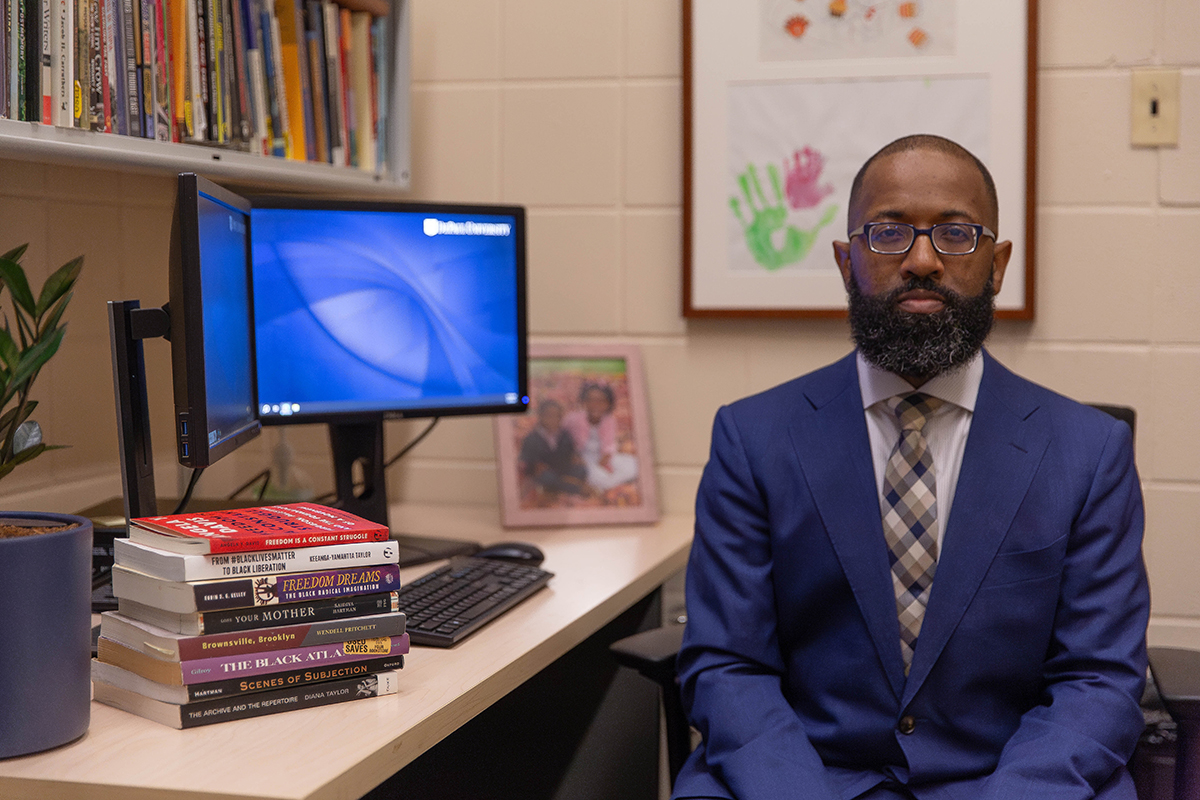 Taurean J. Webb was inducted into the Collegium for his work on historical relationships between Black America and the Middle East. (Photo by Keeton Holder)
Taurean J. Webb was inducted into the Collegium for his work on historical relationships between Black America and the Middle East. (Photo by Keeton Holder)
DePaul Department of African and Black Diaspora Studies and Social Transformation Research Collaborative Postdoctoral Fellow Taurean J. Webb has been inducted into the 38th Martin Luther King Jr. College of Ministers and Laity’s Collegium of Scholars.
The Martin Luther King Jr. College of Ministers and Laity was founded at Morehouse College — a Historically Black College in Atlanta — in 1985 and is inspired by the non-violent approach to social justice practiced by Morehouse alum and activist Martin Luther King Jr. The college consists of three boards, including a Board of Preachers, Board of Sponsors and Collegium of Scholars.
The Collegium of Scholars honors academics, writers, researchers, educators and mentors dedicated to promoting social responsibility, civil rights and human rights. Webb, a graduate of Morehouse, was nominated for induction because of his research, writing and education on the vast historical relationships between Black America and the Middle East. The induction ceremony took place on April 11 of this year at Morehouse College’s Martin Luther King Jr. International Chapel.
“As a student, Morehouse was so significant for me because of its deep affirmation and celebration of Black racial identity and its instruction on how to navigate life as a Black man in America,” Webb says.
In his classes, Webb emphasizes civic engagement and civil protest as important historic tools for liberation movements. For this reason, his passions also lie within the classes he teaches on 20th and 21st century Black freedom movements, Black religion and art as activism.
At the core of his academic contributions are ideas surrounding cultural healing through art and creating conversations about human rights for different Black and otherwise marginalized communities around the world.
“Part of my work focuses on shifting focus from ‘reconciliation’ to questions of justice and equity,” he says. “These questions were many times at the forefront of civic and nonviolent protest and early successes of movements for Black lives.”
Centrally, Webb also re-imagines the definition of “violence” past the physical and into the relationship between oppressions — specifically, what he calls “cultural violence.” In cities like Chicago, Webb says he admires cultural institutions like museums, public memorials, monuments, community centers and places of faith, all of which are crucial to resisting the many faces of cultural violence.
“My work also develops thinking through visual arts as a vehicle for liberation,” Webb says. “Resistance needs to be constructive rather than destructive. It’s about what it means to build and re-build our own communities and institutions.”
As a filmmaker, Webb also emphasizes the importance of integrating creativity and arts-based learning at DePaul, especially when it comes to justice, equity, scholarship and teaching. His research and current film project — supported by the Henry Luce Foundation — focuses on Afro-Arab diasporas and migrations, and he hopes to display this work to the broader DePaul community. Webb says the university is an ideal space for teaching and learning in urban contexts because of its location in Chicago.
Outside of DePaul and Chicago, Webb has an affinity for transnational conversations about social justice and the Global South. He has visited many countries and worked with various artists from around the world to promote cross-cultural art-based engagement. He promotes a similar idea for DePaul students, which he calls “global citizenship.”
“Part of our work as educators is to cultivate not just a learning space for students, but a space where students can cultivate a more equitable world after they graduate from DePaul,” he says.
Webb aspires to continue paving paths for transnational discourse among non-Western nations. Despite their different narratives and historic movements, Webb says Black and non-Black diasporas around the world can come together through mutual visions, storytelling and collaborative social justice.
Webb’s induction into the Collegium of Scholars holds special significance due to the fond memories he has of attending Morehouse College with like-minded scholars and mentor figures. In 2007, Webb presented the Collegium inductee citation to religious scholar Dr. Stephen G. Ray Jr., who would later become his doctoral advisor.
“15 years ago, I promised myself that one day, I’d be on the other side of the stage receiving this citation,” Webb says. “There’s something really special and full circle about this moment for me now.”
Emily Diaz is a student assistant for internal communications in University Communications.